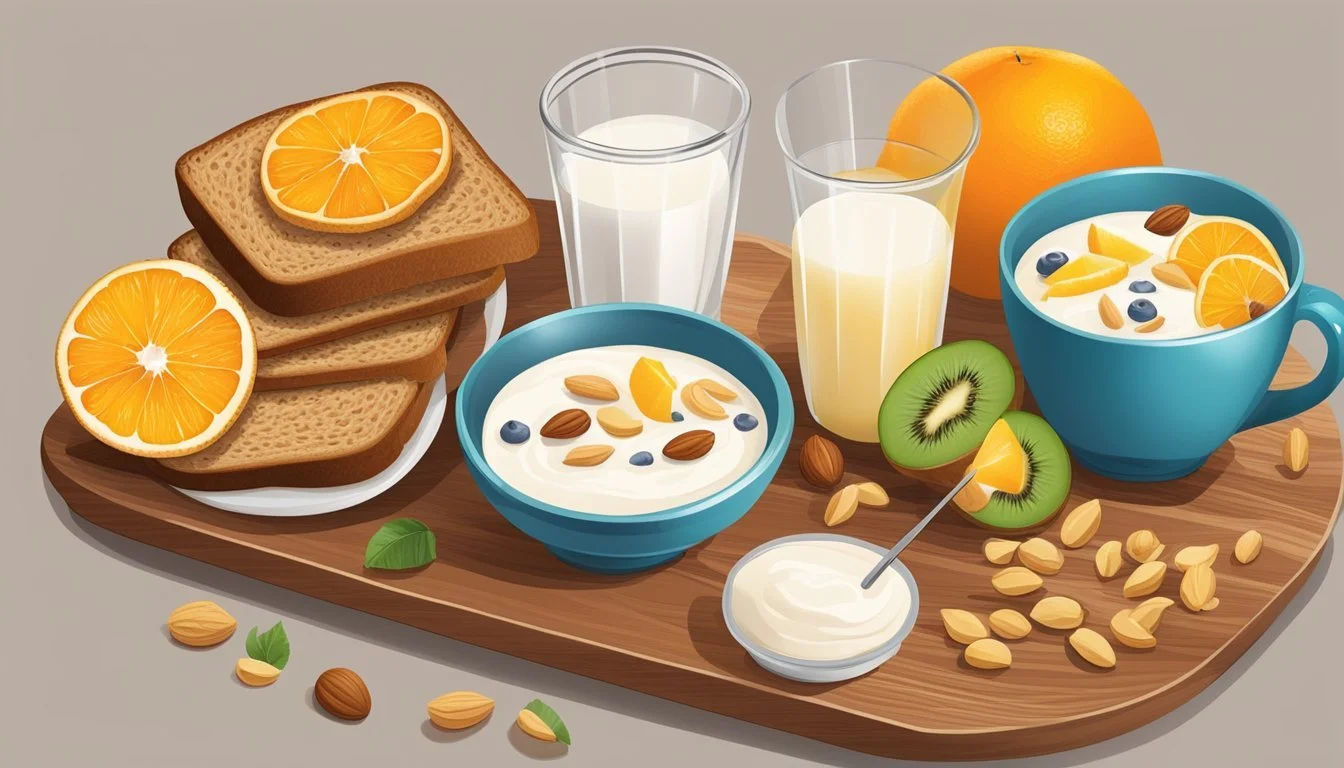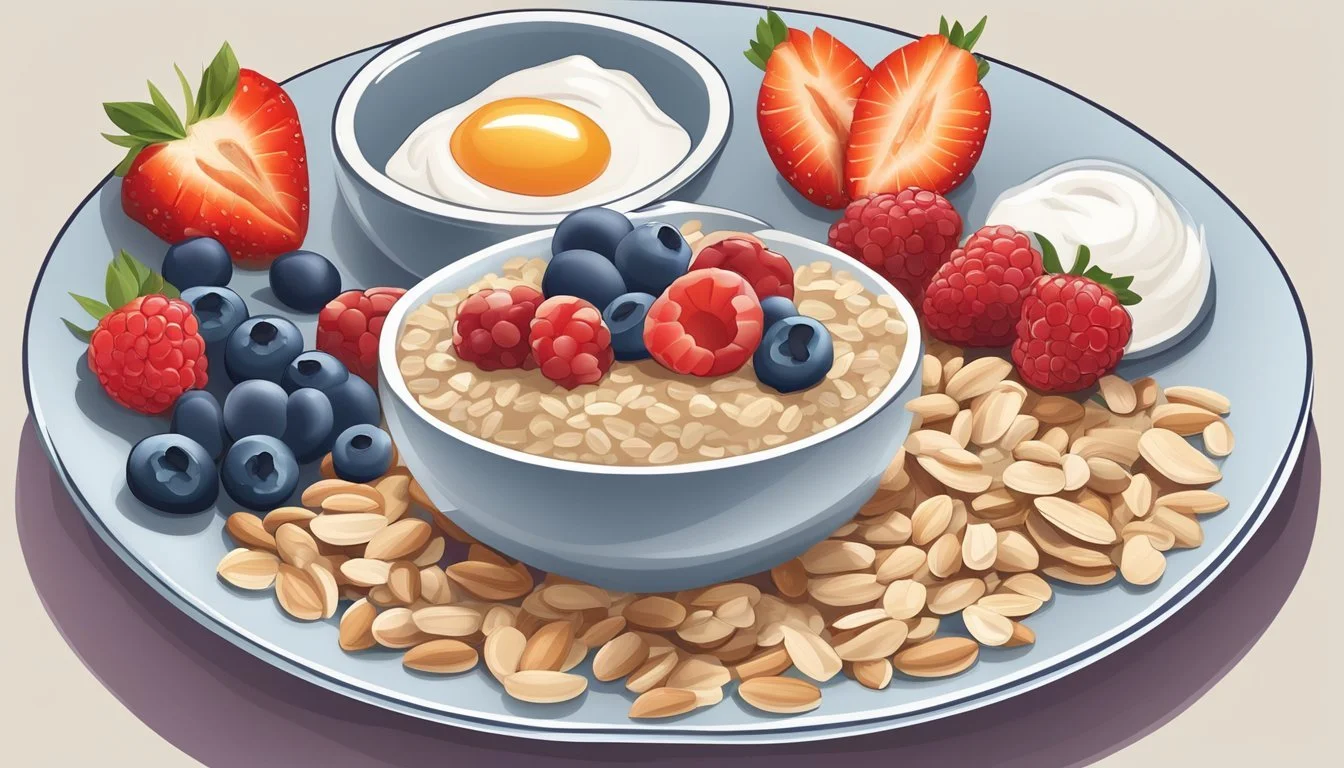Delicious Diabetes-Friendly Breakfast Ideas Without Eggs
Planning a nutritious breakfast when managing diabetes can be challenging, especially for those who don't enjoy eggs or need variety in their morning routine. Many traditional breakfast foods are high in carbohydrates, which can cause blood sugar spikes. Fortunately, there are numerous delicious and satisfying low-carb breakfast options that don't include eggs, making it easier for people with diabetes to start their day on the right foot.
A diabetes-friendly breakfast should focus on balanced nutrition, incorporating protein, healthy fats, and complex carbohydrates to help stabilize blood sugar levels. Options like Greek yogurt with berries and nuts, chia seed pudding, or avocado toast on whole-grain bread can provide the necessary nutrients without relying on eggs. These alternatives offer a range of flavors and textures, ensuring that breakfast remains an enjoyable and essential part of diabetes management.
Understanding Diabetes and Diet
Proper nutrition plays a crucial role in managing diabetes and maintaining stable blood glucose levels. A well-planned diet can help control insulin sensitivity and reduce the risk of complications.
The Role of Breakfast in Blood Sugar Management
Breakfast is a key meal for people with diabetes. It helps kickstart metabolism and provides energy for the day ahead. A balanced breakfast can stabilize blood sugar levels, preventing spikes and crashes. Aim for a combination of fiber-rich carbohydrates, lean protein, and healthy fats.
Fiber slows down digestion, leading to a gradual rise in blood glucose. Protein and fats further aid in blood sugar control. Choose whole grains, fruits, and vegetables for complex carbohydrates. Include nuts, seeds, or avocado for healthy fats.
Timing matters too. Eating breakfast within an hour of waking can help regulate blood sugar throughout the day. Consistency in meal timing supports better insulin management.
Nutrition Fundamentals for Diabetes
A diabetes-friendly diet focuses on nutrient-dense foods that support overall health. Carbohydrate management is essential, as carbs have the most significant impact on blood glucose. Opt for complex carbohydrates over simple sugars.
Protein is important for tissue repair and satiety. Choose lean sources like poultry, fish, and plant-based options. Healthy fats from sources like olive oil and fatty fish can improve heart health and insulin sensitivity.
Vitamins and minerals play vital roles in metabolism and blood sugar regulation. Focus on a variety of colorful fruits and vegetables. Adequate hydration is also crucial for blood sugar management.
Portion control helps maintain a healthy weight, reducing diabetes risk factors. Use smaller plates and practice mindful eating. Regular meal patterns support consistent blood glucose levels throughout the day.
Curating Egg-Free Breakfast Ideas
Crafting nutritious, satisfying breakfasts without eggs is achievable through thoughtful ingredient selection and creative recipes. Protein-rich alternatives, low-carb options, and high-fiber foods can form the foundation of delicious morning meals.
Protein-Rich Alternatives to Eggs
Greek yogurt stands out as a versatile protein source for breakfast. It can be paired with berries, nuts, and seeds for added nutrition and flavor. Cottage cheese offers another protein-packed option, easily customizable with fresh fruit or savory toppings.
Tofu scrambles mimic egg dishes while providing plant-based protein. Seasoned with turmeric, nutritional yeast, and vegetables, tofu creates a filling breakfast.
Lean meats like turkey or chicken sausage offer protein without the eggs. Paired with avocado or cheese, they create a satisfying meal.
Nut butters spread on whole grain toast or mixed into smoothies boost protein intake. Almonds, walnuts, and pumpkin seeds make nutrient-dense breakfast additions.
Incorporating Low-Carb Breakfast Foods
Avocado toast on low-carb bread provides healthy fats and fiber. Top with tomatoes, feta cheese, or smoked salmon for extra flavor and nutrients.
Smoothie bowls made with unsweetened almond milk, berries, and spinach offer a low-carb start to the day. Add chia seeds or flaxseeds for omega-3 fatty acids.
Veggie-packed omelets using chickpea flour instead of eggs create a low-carb, high-protein meal. Fill with mushrooms, bell peppers, and spinach for added nutrients.
Chia seed pudding prepared with almond milk and topped with unsweetened coconut flakes and a small amount of berries fits well into a low-carb diet.
High-Fiber Breakfast Options
Overnight oats made with rolled oats, chia seeds, and milk alternatives provide a fiber-rich breakfast. Add cinnamon, vanilla, and a small amount of honey for flavor.
Grain-free "noatmeal" using coconut flour, flaxseed meal, and almond milk mimics the texture of oatmeal while offering high fiber content.
Smoothies blended with leafy greens, berries, and a scoop of plant-based protein powder create a fiber-packed breakfast drink.
Lentil or chickpea pancakes offer a high-fiber alternative to traditional flour-based recipes. Top with Greek yogurt and fresh berries for added nutrients.
Whole grain toast topped with mashed avocado and sliced tomatoes provides a simple, fiber-rich breakfast. Sprinkle with hemp seeds for extra protein and omega-3s.
Diabetes-Friendly Breakfast Recipes
Nutritious breakfast options for diabetes management emphasize complex carbohydrates, healthy fats, and balanced macronutrients. These recipes focus on blood sugar control while providing satisfying and delicious meals to start the day.
Savory Breakfast Choices
Avocado toast on whole grain bread offers a fiber-rich base with healthy fats. Top with sliced tomatoes, spinach, and a sprinkle of seeds for added nutrients.
Tofu scramble provides a protein-packed alternative to eggs. Sauté crumbled tofu with bell peppers, onions, and turmeric for color and flavor. Serve with a side of roasted mushrooms for extra umami.
Whole grain toast with nut butter and sliced banana delivers a balance of complex carbs and protein. Choose sugar-free nut butter to keep added sugars in check.
A savory smoothie bowl made with spinach, cucumber, and avocado creates a nutrient-dense base. Top with pumpkin seeds, hemp hearts, and a dash of lemon juice for brightness.
Sweet Breakfast Options Without Added Sugars
Berry parfaits layered with Greek yogurt and a sprinkle of nuts offer natural sweetness without added sugars. Choose plain, unsweetened yogurt and add cinnamon for flavor.
Chia seed pudding made with unsweetened almond milk and topped with fresh berries provides omega-3 fatty acids and fiber. Prepare the night before for a quick grab-and-go option.
Protein smoothies blended with unsweetened plant milk, frozen berries, and a scoop of protein powder create a filling meal. Add spinach or kale for extra nutrients without altering the taste.
Sugar-free oatmeal cookies made with mashed banana, oats, and cinnamon make a portable breakfast treat. Bake a batch and freeze for easy morning meals throughout the week.
Innovative Uses of Alternatives to Traditional Flours
Almond flour pancakes offer a low-carb, grain-free alternative to traditional flapjacks. Mix almond flour with eggs, unsweetened almond milk, and baking powder. Top with fresh berries or sugar-free syrup.
Coconut flour muffins provide a gluten-free option high in fiber. Combine coconut flour with eggs, unsweetened applesauce, and cinnamon for a moist, diabetes-friendly muffin.
Flaxseed meal porridge creates a warm, comforting breakfast rich in omega-3s. Cook ground flaxseed with unsweetened almond milk and top with nuts and berries.
Chickpea flour crepes offer a savory, protein-rich wrapper for breakfast burritos. Fill with sautéed vegetables and a sprinkle of cheese for a satisfying meal.
Overnight Oats Varieties
Classic overnight oats combine rolled oats with unsweetened almond milk and chia seeds. Add cinnamon and vanilla extract for flavor without sugar.
Pumpkin pie overnight oats incorporate pumpkin puree, pumpkin pie spice, and Greek yogurt for a creamy, fall-inspired breakfast. Top with pecans for crunch.
Carrot cake overnight oats mix grated carrots, raisins, and walnuts into the base for a dessert-inspired, nutrient-dense meal. Add a dash of nutmeg for warmth.
Green tea matcha overnight oats blend matcha powder into the oat mixture for an antioxidant boost. Top with sliced kiwi and unsweetened shredded coconut for texture and flavor.
Managing Portion Sizes and Macronutrients
Controlling portions and balancing macronutrients are crucial for managing diabetes through diet. These strategies help regulate blood sugar levels and support overall health.
Balancing Macronutrients for Sustained Energy
A balanced breakfast should include carbohydrates, protein, and healthy fats. Aim for 45-60 grams of carbs, 15-20 grams of protein, and 10-15 grams of fat.
Choose complex carbs like whole grains, fruits, and vegetables. These provide fiber and slow-release energy. Pair them with lean proteins such as Greek yogurt, nuts, or seeds.
Include healthy fats from avocados, olive oil, or chia seeds. These help with nutrient absorption and promote satiety.
Monitor total calorie intake to support weight management. A typical diabetes-friendly breakfast ranges from 300-400 calories.
Strategies for Portion Control
Use measuring tools to accurately gauge serving sizes. A food scale or measuring cups can help prevent overeating.
Try the plate method: Fill half with non-starchy vegetables, a quarter with lean protein, and a quarter with complex carbs.
Use smaller plates to create the illusion of larger portions. This visual trick can help reduce overall intake.
Pre-portion breakfast items the night before. This eliminates guesswork and saves time in the morning.
Read nutrition labels carefully. Pay attention to serving sizes and adjust portions accordingly to fit within your meal plan.
Lifestyle Considerations
Managing diabetes involves more than just dietary choices. Physical activity and understanding risk factors play crucial roles in maintaining stable blood sugar levels and overall health.
Physical Activity and Its Impact on Blood Sugar
Regular exercise is vital for people with diabetes. It helps improve insulin sensitivity, allowing cells to use glucose more effectively. Aim for 150 minutes of moderate-intensity aerobic activity per week, spread over at least 3 days. This can include brisk walking, swimming, or cycling.
Physical activity can lower blood sugar levels for up to 24 hours after exercise. Monitor blood glucose before, during, and after workouts to prevent hypoglycemia. Adjust insulin doses or eat a small snack if needed.
Strength training is also beneficial. It builds muscle mass, which increases metabolism and helps control blood sugar. Include resistance exercises 2-3 times per week.
Understanding and Mitigating Risk Factors
Several factors increase the risk of developing Type 2 diabetes or complications in those already diagnosed. Being overweight or obese is a primary risk factor. Losing 5-10% of body weight can significantly improve insulin sensitivity.
High blood pressure and abnormal cholesterol levels often accompany diabetes. These conditions increase the risk of heart disease. Regular check-ups and medication, if prescribed, are essential to manage these issues.
Family history plays a role in diabetes risk. Those with first-degree relatives with diabetes should be extra vigilant about their lifestyle choices. Smoking increases insulin resistance and the risk of diabetes complications. Quitting is crucial for better health outcomes.
Stress management is important as chronic stress can affect blood sugar levels. Techniques like meditation, deep breathing, or yoga can help reduce stress and improve overall well-being.
Smart Grocery Shopping for Diabetes
Planning your grocery trips and making informed choices can significantly impact diabetes management. Focus on nutrient-dense, low-carb options that help maintain stable blood sugar levels.
Selecting Diabetes-Friendly Ingredients
Choose whole, unprocessed foods whenever possible. Opt for non-starchy vegetables like leafy greens, broccoli, and cauliflower. Select lean proteins such as chicken, fish, and tofu. Include healthy fats from sources like avocados, nuts, and olive oil.
Look for low-glycemic fruits like berries and apples. Choose whole grains in moderation, such as quinoa or brown rice. Dairy products can be part of a diabetes-friendly diet - select low-fat or non-fat options like Greek yogurt or cottage cheese.
Consider sugar-free alternatives for sweetening foods and beverages. Read nutrition labels carefully to identify hidden sugars and carbohydrates.
Avoiding Common Pitfalls
Steer clear of highly processed foods, which often contain hidden sugars and unhealthy fats. Limit or avoid sugary drinks, including fruit juices and sodas. Be cautious with "diabetic" or "sugar-free" products, as they may still impact blood sugar levels.
Watch portion sizes, especially for carbohydrate-rich foods. Avoid impulse purchases of high-carb snacks or desserts. Skip the bakery section to resist temptation from bagels, pastries, and other high-carb baked goods.
Be mindful of breakfast cereals, which can be high in sugar and carbs. Instead, consider alternatives like unsweetened oatmeal or low-carb granola. Choose turkey or Canadian bacon over regular bacon or sausage for lower fat content.
Conclusion
Diabetes-friendly breakfasts without eggs offer numerous nutritious options. Whole grains, lean proteins, and fiber-rich foods provide sustainable energy and help manage blood sugar levels effectively.
Plant-based proteins like tofu, nuts, and seeds serve as excellent alternatives to eggs. These foods offer essential nutrients while supporting a balanced diet for individuals with diabetes.
Incorporating a variety of fruits and vegetables adds vitamins, minerals, and antioxidants to breakfast meals. These nutrient-dense choices contribute to overall health and diabetes management.
Portion control remains crucial in any diabetes-friendly diet. Monitoring carbohydrate intake and balancing it with proteins and healthy fats helps maintain stable blood glucose levels throughout the day.
Consulting with a healthcare provider or registered dietitian can provide personalized guidance for creating optimal breakfast plans. They can offer tailored advice based on individual needs and health goals.
By focusing on nutrient-rich, low-glycemic options, individuals with diabetes can enjoy satisfying and delicious breakfasts without relying on eggs. This approach supports long-term health and effective diabetes management.






